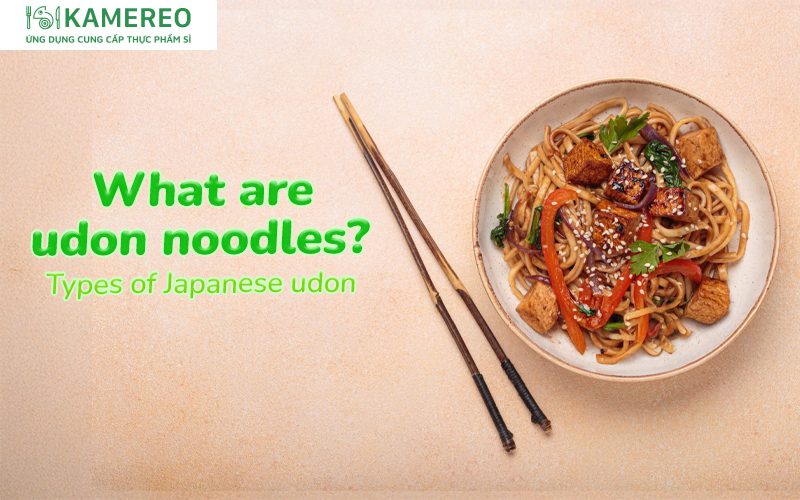Japan is known for its diverse culinary scene, especially its noodle varieties. Among them, udon noodles are a popular dish, originating from the Kagawa region. Thick, chewy udon noodles are often served with a rich broth, creating an unforgettable distinctive flavor. So, what are the characteristics of udon noodles? What are the popular types? Let’s explore in more detail through this article with Kamereo.
What are Udon Noodles?
Udon noodles are a traditional Japanese noodle dish. These noodles are made from wheat flour and have thick, chewy strands served in hot broth. What’s special is that udon noodles are versatile in combining with various broths and toppings, depending on each region in Japan.
To add richness to the dish, udon is often served with ingredients like large shrimp, fried tofu pockets, mirin, soy sauce, or various vegetables. These ingredients not only add nutrients but also contribute to a unique and appealing flavor combination.
Udon noodles can be square or round, and when cooked, the noodles expand and become characteristically soft. It is also a favorite dish when served cold in the summer in Japan.
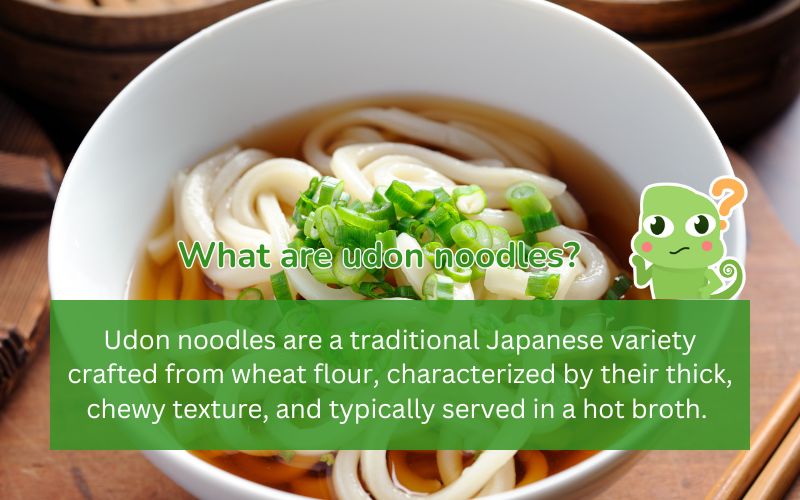
Origins of Udon Noodles
The origin of udon noodles is a multifaceted story with various theories. One of the most frequently mentioned theories relates to Kukai, a 9th-century Buddhist monk. After traveling to China, he brought noodle-making techniques back to Sanuki Province, which later became the cradle of udon noodles.
In 1241, a significant advancement in udon noodle history occurred when a Rinzai monk introduced flour grinding techniques learned from the Song Dynasty. This technique contributed to perfecting the dough kneading process, a crucial factor that created the unique characteristics of udon noodles and quickly made them famous throughout Japan.
Additionally, another legend tells that during the Nara period, a monk on a trip to Tang Dynasty China was impressed with a type of cake called sakubei, also known as muginawa. This cake is believed to be the predecessor of udon noodles, adding to the diversity of stories about the dish’s origins.
Although the exact origin remains a mystery, the cultural and culinary value that udon noodles bring cannot be denied. This dish has become an indispensable part, contributing to the distinctive and unique mark of the culinary culture of the Land of the Rising Sun.
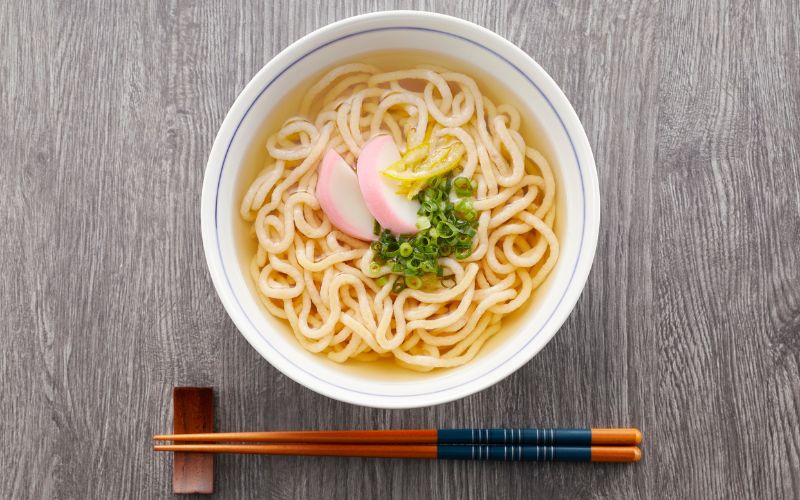
Types of Japanese Udon Noodles
Below are 14 famous udon noodle dishes from Japan, each with its own unique flavor:
Kake Udon
Kake Udon is the simplest udon noodle dish, with chewy udon noodles soaked in hot broth. This broth is usually made from dashi (broth from bonito flakes and kelp), soy sauce, and mirin (a type of Japanese sweet rice wine). Sometimes, finely chopped scallions are added to enhance the flavor and color of the dish.
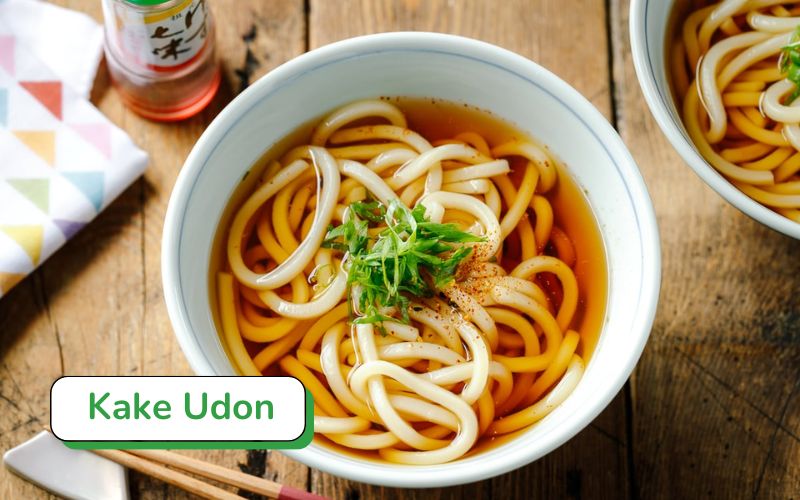
Tempura Udon
Tempura Udon is a harmonious combination of udon noodles and tempura (fried seafood or vegetables). The tempura pieces are usually placed on the noodles or served separately on a plate. Depending on the season and each restaurant, the accompanying tempura can vary, bringing diversity and richness to Japanese udon noodles.
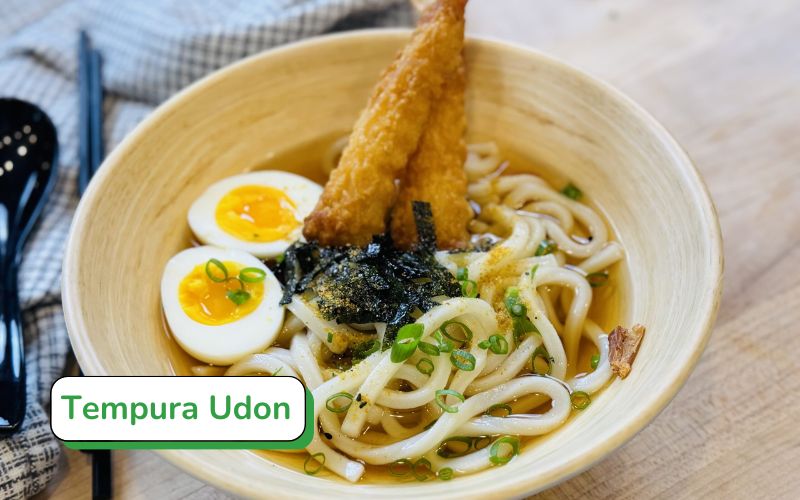
Curry Udon
Curry Udon is a unique udon noodle dish, deeply imbued with Japanese culinary culture. Chewy udon noodles are mixed in a smooth, rich Japanese curry sauce. This dish is especially popular in winter, as the spicy flavor of the curry helps warm the body.
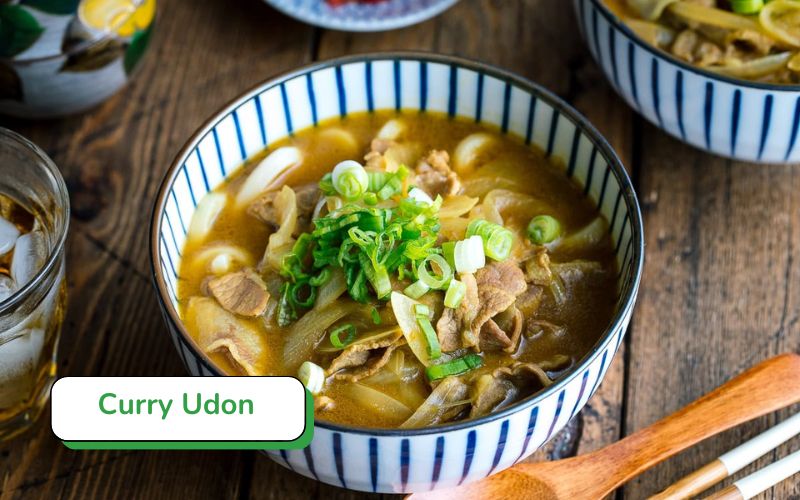
Nabeyaki Udon
Nabeyaki Udon is a hearty udon noodle dish with many accompanying ingredients such as mushrooms, eggs, kamaboko (Japanese fish cake), and greens. This dish is cooked in a hot clay pot before being served. Nabeyaki Udon is not only delicious but also nutritious, suitable for enjoying on chilly days.
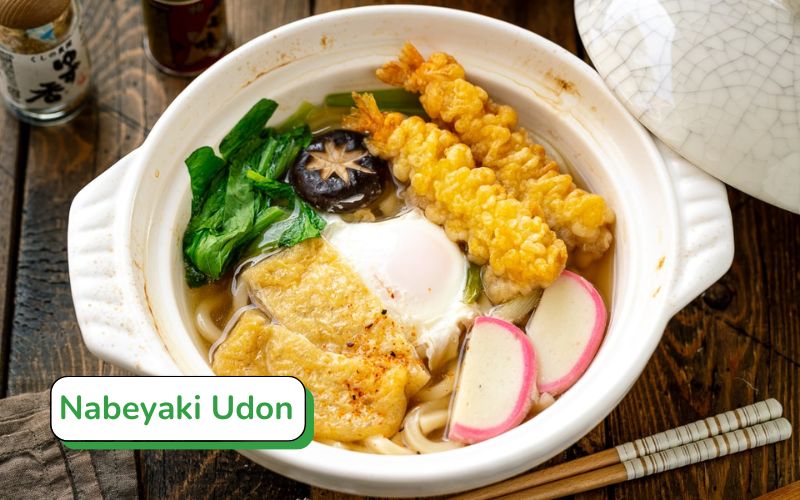
Kitsune Udon
Kitsune Udon is a familiar udon noodle dish, with hot dashi broth, chewy noodles, and characteristic golden fried tofu (aburaage) pieces. In addition to fried tofu, Kitsune Udon is sometimes decorated with finely chopped scallions, creating a simple but appealing dish.
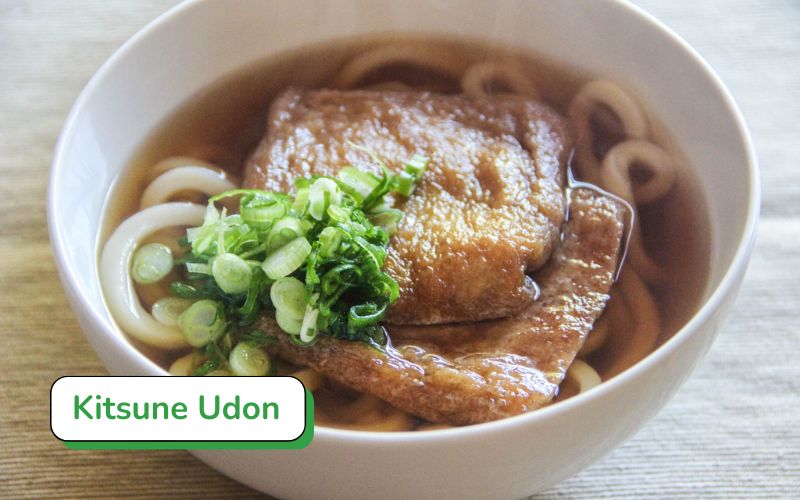
Chikara Udon
Chikara Udon is a special udon noodle dish, notable for its unique combination of chewy noodles and soft, flexible mochi rice cakes. Mochi is added to the hot broth, creating a rich flavor and smoothness for the dish. The name “chikara” in Japanese means “strength,” stemming from the belief that this dish provides energy and strength to the eater.
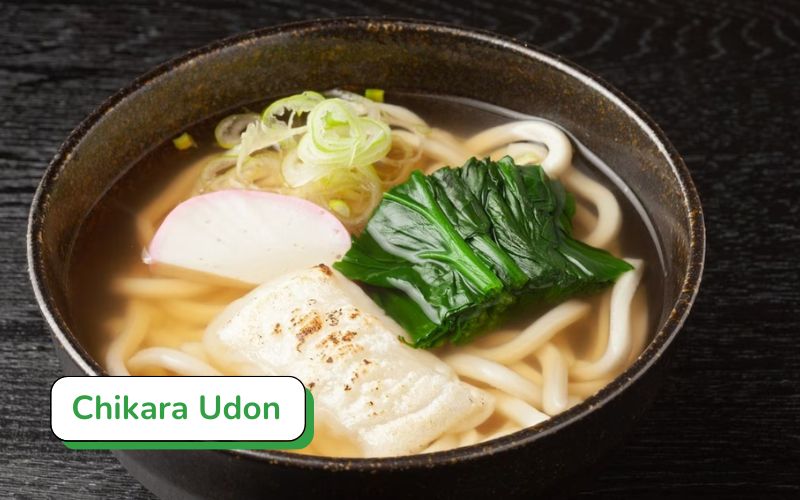
Tanuki Udon
Tanuki Udon is prepared with hot broth, sprinkled with crispy fried tempura crumbs. In Osaka, the free use of tenkasu (tempura crumbs) at udon restaurants makes Tanuki Udon less popular. However, in other places, Tanuki Udon is still a favorite noodle dish thanks to its simple, familiar flavor.
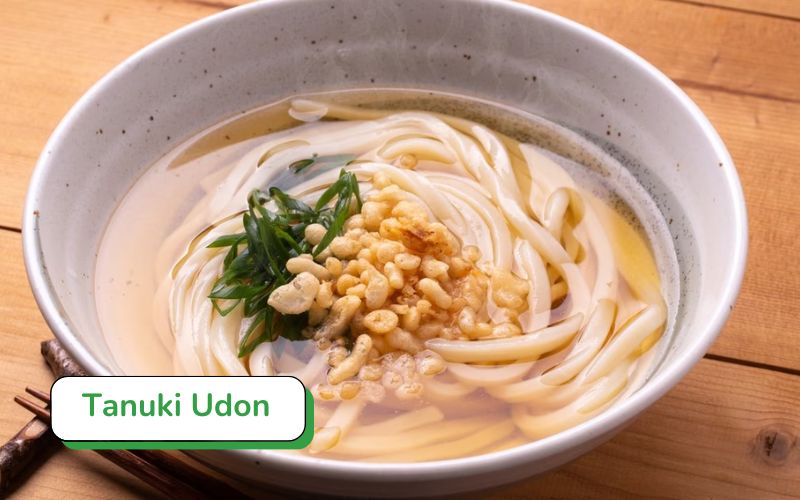
Tsukimi Udon
Tsukimi Udon, also known as Moon Viewing Udon, is an udon noodle dish with delicate and romantic beauty. This name comes from the image of a raw chicken egg placed on hot udon noodles, resembling a full moon in the night sky. When enjoying it, you will feel the blend of the sweet, fatty taste of chicken eggs and the chewy noodles.
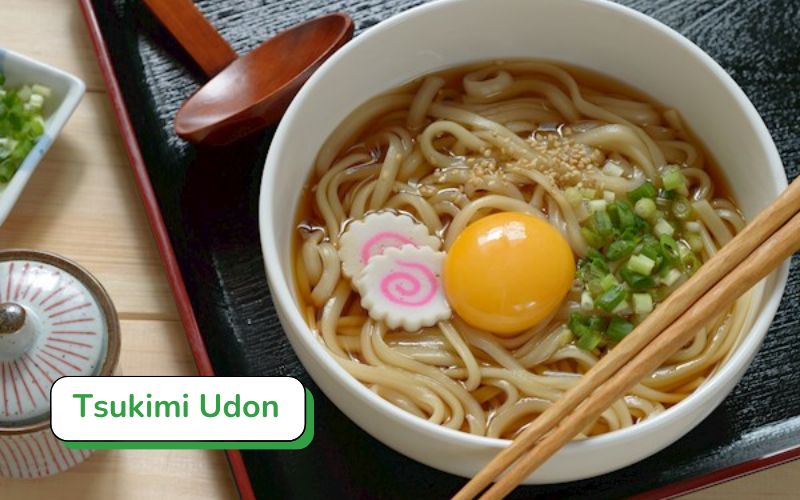
Wakame Udon
Wakame Udon is a light, nutritious udon noodle dish with the main ingredient being wakame seaweed. This is a dark green seaweed, often used in soups, especially miso soup. When combined with udon noodles, wakame brings a characteristic sea flavor, along with great health benefits.
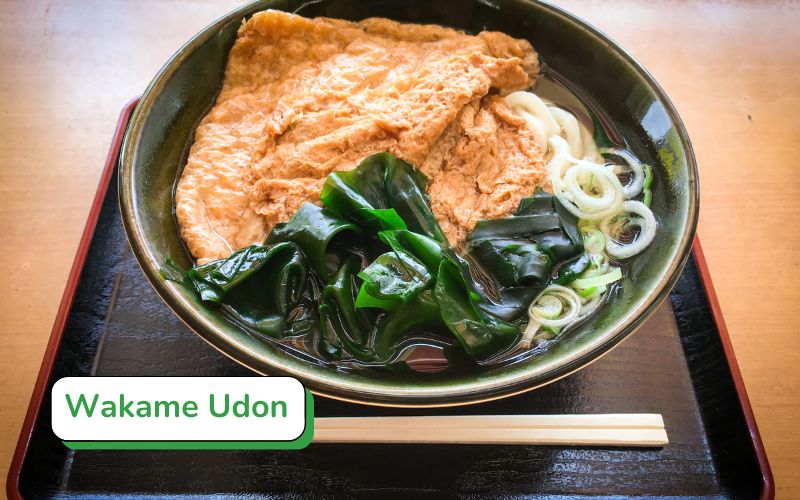
Karē Udon
This is a unique blend of Japanese and Indian cuisine, featuring udon noodles cooked with rich curry broth, bringing a spicy, fragrant flavor. Usually, Karē Udon can also be supplemented with meat and vegetables, adding richness and variety.
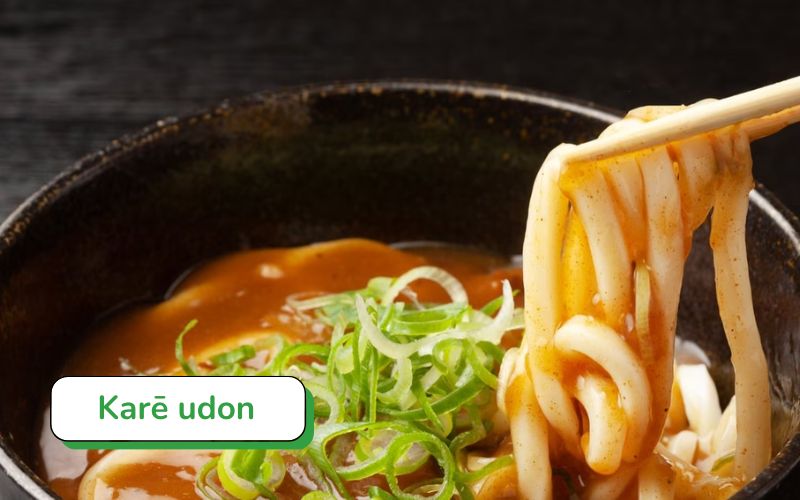
Zaru Udon
Zaru Udon is a special udon noodle dish with thick, chewy noodles, served cold on a bamboo mat. The highlight of the dish lies in the way it is enjoyed; diners dip the noodles in a rich dipping sauce before eating. Compared to other types of udon, Zaru Udon stands out with its freshness and coolness, especially suitable for hot summer days.
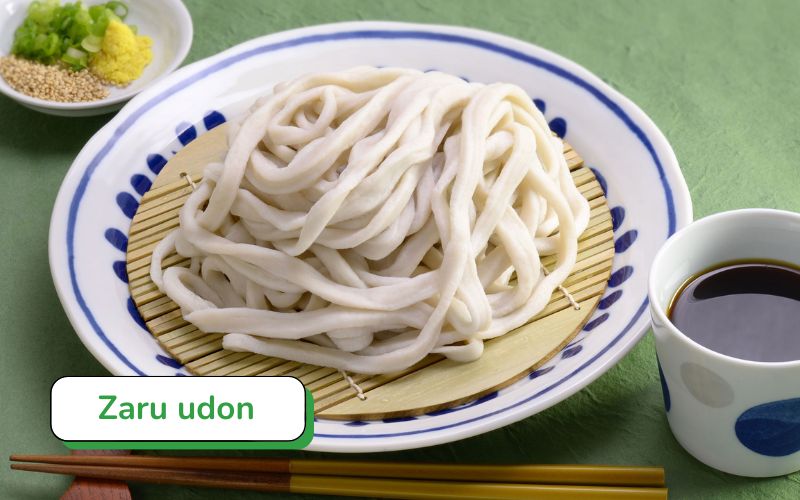
Bukkake Udon
Bukkake Udon is an udon noodle dish with diverse flavors and ingredients. After being boiled, the noodles are topped with many rich ingredients and spices, then drizzled with a little rich dashi soup. The special thing about Bukkake Udon is its flexibility in preparation; noodles and soup can be served hot or cold depending on preference.
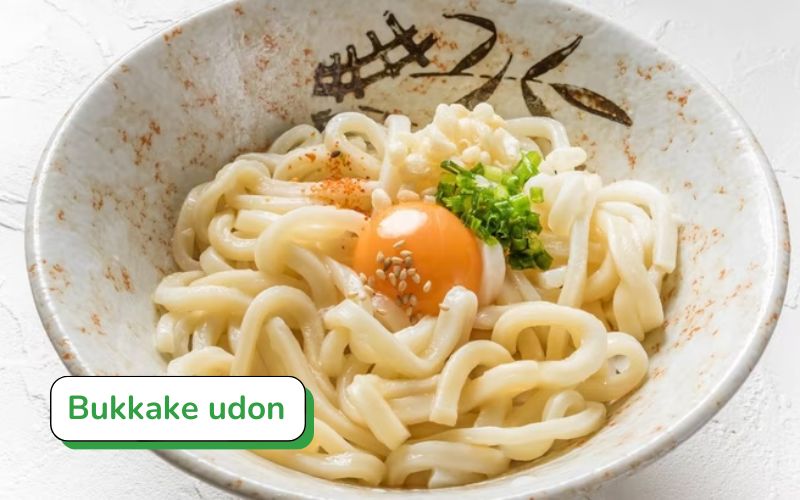
Hadaka Udon
Hadaka Udon is a simple dish, consisting only of udon noodles and dashi soy sauce, without any other ingredients. After being boiled, the udon noodles are rinsed, drained, and chilled, then placed in a bowl with dashi soy sauce. To preserve the pure flavor of the dish, the accompanying spices are carefully selected, using only simple ingredients such as grated radish, sudachi, citrus fruits, and scallions.
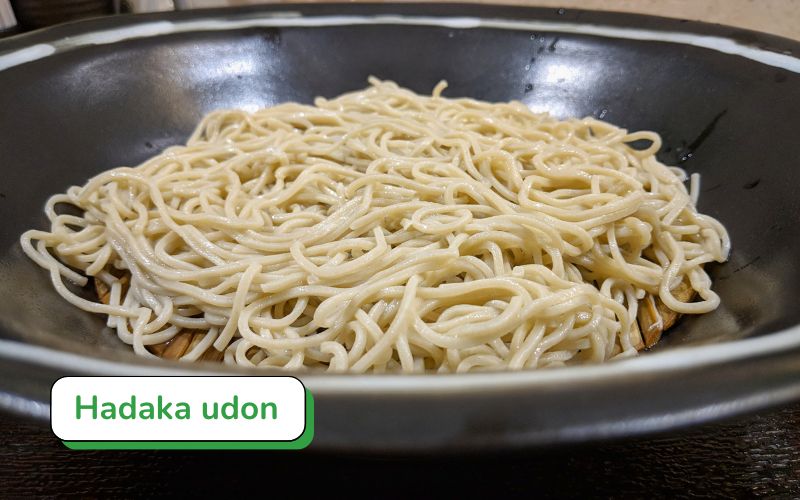
Kijōyu Udon
Kijōyu Udon is a type of udon noodle with a long history, originating from the Hakata region, Fukuoka Prefecture. Hakata udon noodles are famous for their characteristic thickness and softness, served in dashi broth, light soy sauce, served with burdock tempura, surimi fish powder, or sliced meat. It is said that the first people to make udon noodles in Hakata based their recipe on that passed down by Zen master Enni, who brought the flour grinding method to Japan.
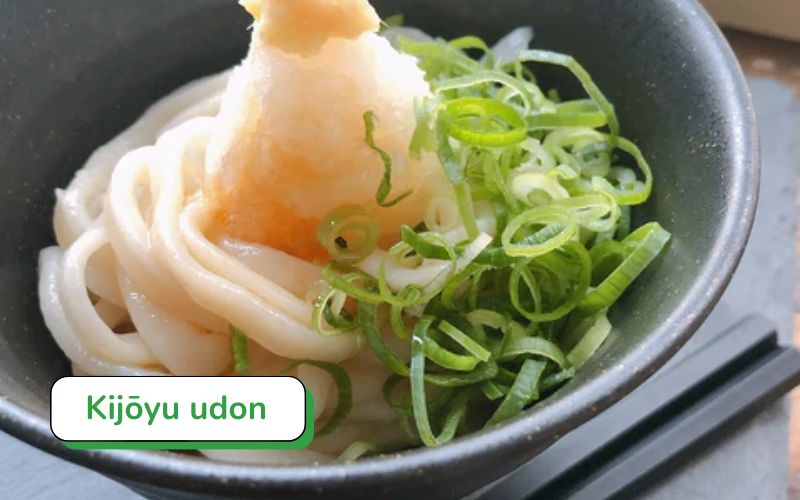
How to Enjoy Udon Noodles
Udon noodles, known for their thick, chewy texture, are not only a staple in Japanese cuisine but also a delightful experience for food lovers worldwide. To fully appreciate the flavors of udon noodles, you can refer to these two popular ways of enjoying them:
- Enjoying Hot Udon Noodles:
On chilly days, a piping hot bowl of udon with a rich broth is an excellent choice. Hot udon varieties like Kake udon, Kitsune udon, and Tempura udon all offer delicious and appealing flavors. When eating hot udon, you can freely slurp the noodles to cool them down, a unique aspect of Japanese food culture.
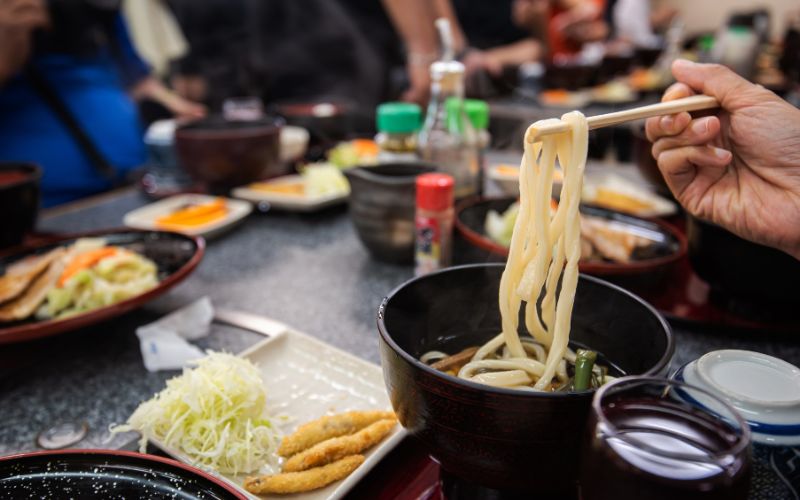
- Cooling Down in Summer with Cold Udon Noodles:
In the summer, cold udon is favored for its refreshing and cooling qualities. Cold udon varieties such as Zaru udon and Bukkake udon are often served with a separate dipping sauce. When eating, simply pick up the noodles and dip them in the sauce, avoiding pouring the sauce directly onto the noodles to preserve the dish’s distinct flavor.
Kamereo – Supplier of Authentic Japanese Udon Noodle Ingredients
Proud to be a partner of Gyomu Japan, a Japanese domestic supermarket chain, Kamereo is a platform specializing in providing Japanese domestic ingredients to F&B businesses. With a strong focus on strict quality control, modern storage, and preservation facilities, Kamereo is committed to delivering convenient, high-quality purchasing solutions, optimizing operations.
With the mission to streamline the procurement process for F&B businesses, Kamereo is an “all-in-one supplier,” meeting all ingredient and equipment needs for the F&B industry. From fresh and frozen foods to beverage ingredients and kitchen utensils, everything can be found and ordered on a single platform. This enables businesses to save time and costs effectively.

Kamereo’s most significant distinction from traditional suppliers lies in its use of technology to optimize the procurement and cost management processes. Kamereo’s website and app not only support order placement but also assist in managing multiple stores, approving orders, tracking expenses, and analyzing data.
Kamereo also ensures stability and reliability for F&B businesses by offering order placement until 12 midnight and swift delivery by 6 am the next morning. We guarantee that your business’s kitchen will always be ready to operate without worrying about supply.
Purchase Authentic Japanese Udon Noodle Ingredients at Great Prices at Kamereo:
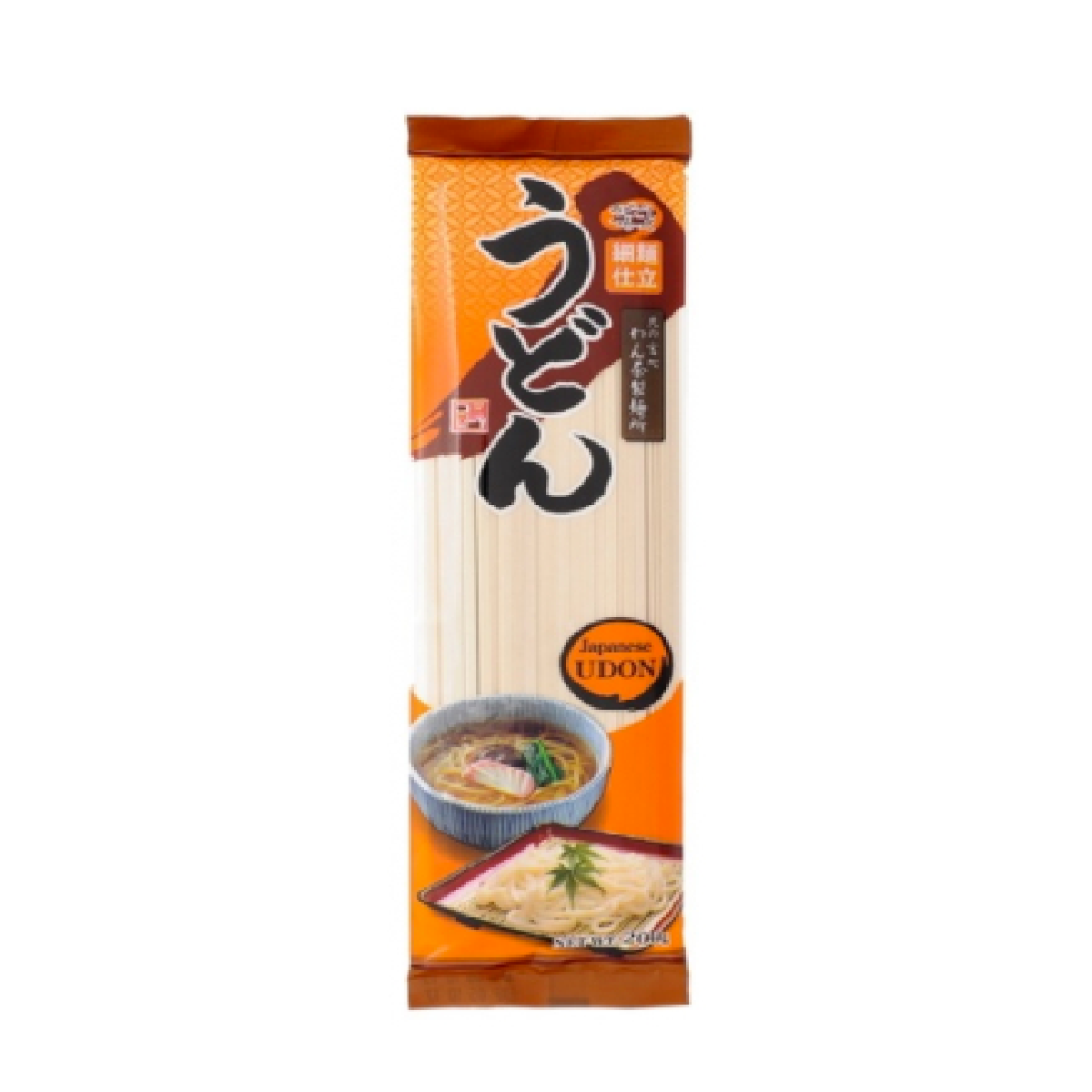
Udon Yamamori 200g
39,000đ/PACK
46,000đ/PACK
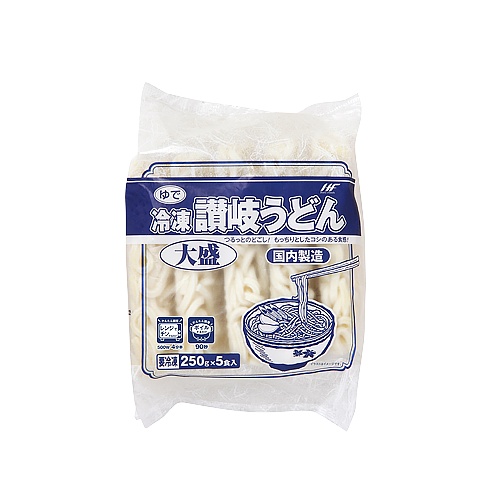
Frozen Thick Udon Noodles 1.25kg
79,000đ/PACK
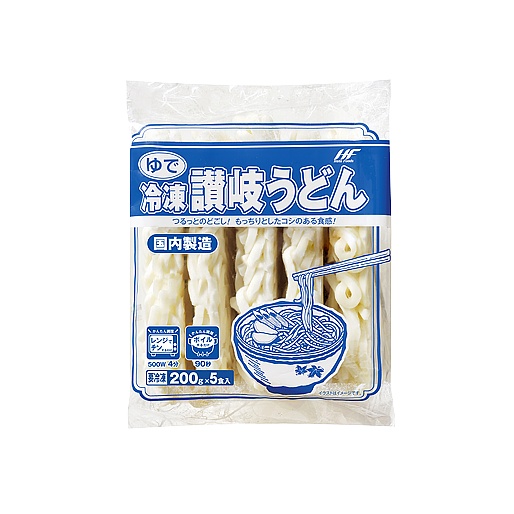
Frozen Udon Noodles 1kg
83,000đ/PACK
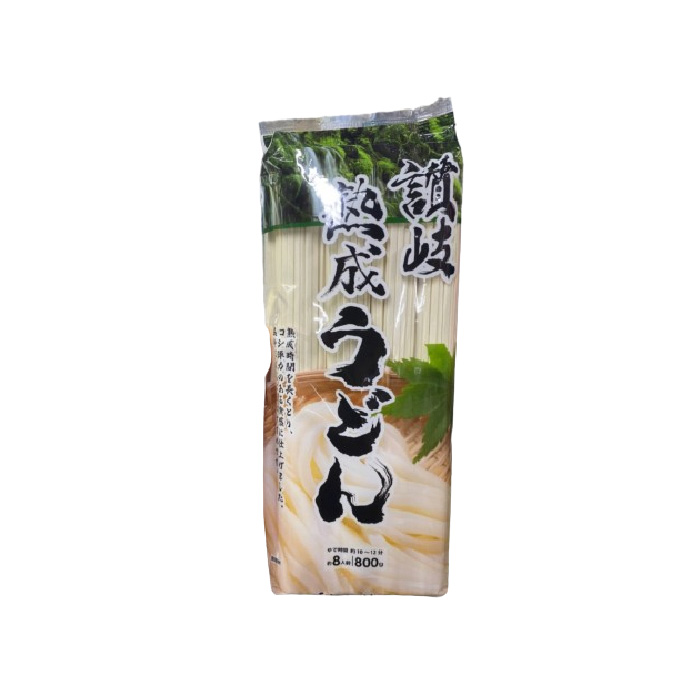
Sanuki Udon Noodles 800g
79,000đ/PACK
Conclusion
This article has helped you better understand udon noodles, a traditional Japanese dish with many diverse variations. With their convenience and variety, these noodles are an ideal choice for quick yet nutritious and delicious meals. Also, if you want to prepare delicious bowls of udon yourself, don’t forget to visit Kamereo for the freshest and highest quality ingredients! Visit our Food and Lifestyle section to learn more useful and interesting information.
See more:



